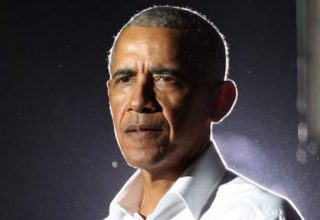
French President Emmanuel Macron has called on Lebanon to swiftly form a new government, following the appointment of its new prime minister.
Lebanon’s former ambassador to Germany, Mustapha Adib, has taken on the new role with the backing of most MPs.
Senior Lebanese officials say Mr Macron’s mediation has been crucial in reaching consensus on the appointment.
The last government resigned following the devastating explosion in the capital, Beirut, on 4 August.
At least 200 people were killed by the blast, caused by ammonium nitrate stored unsafely at the city’s port.
Mr Macron arrived in Beirut on Monday for his second visit since the deadly explosion. During his stay he is expected to push Lebanese politicians to tackle corruption and financial waste.
Speaking to reporters, he said a new government should be formed “as soon as possible” – something that Mr Adib has already promised.

But during his visit Mr Macron has been met by protesters chanting “no Adib” – a sign that Mr Adib’s appointment is seen by some as a continuation of the country’s status quo.
Demonstrators have staged mass rallies across Lebanon since October, calling for a complete overhaul of the political system. Power is largely based on sectarian interests in the country, and successive government have been accused of ineffective and elitist leadership.
Political appointments and many jobs depend on belonging to one of Lebanon’s myriad religious communities, a situation which has led to patronage, cronyism and endemic corruption.
Mr Adib’s appointment comes at a time of deep crisis for Lebanon, still reeling from the blast which also left thousands of people injured and districts in ruins. Even before the explosion, the country was in dire financial trouble as the currency collapsed, unemployment soared and poverty grew.
It has also been grappling with the impact of the coronavirus pandemic, which has compounded the economic slump.
Who is Mustapha Adib?
Mr Adib, 48, was appointed Lebanon’s ambassador to Germany in 2013.
He has a doctorate in law and political science, and previously taught at universities in Lebanon and France. He has also served as an adviser to former Lebanese Prime Minister Najib Mikati.
A group of former prime ministers, including Saad Hariri who leads Lebanon’s main Sunni Muslim party The Future Movement, announced that they were endorsing Mr Adib after reviewing several names on Sunday.
Following his nomination, Mr Adib said there was “a need to form a government in record time and to begin implementing reforms immediately, starting with an agreement with the International Monetary Fund”.
Historically, governments have taken weeks or months to form after a new prime minister takes office, although parties have indicated a willingness to expedite the process under the current circumstances.
Until a new administration is agreed, outgoing Prime Minister Hassan Diab’s government will continue in a caretaker capacity.

Source: bbc.com

















